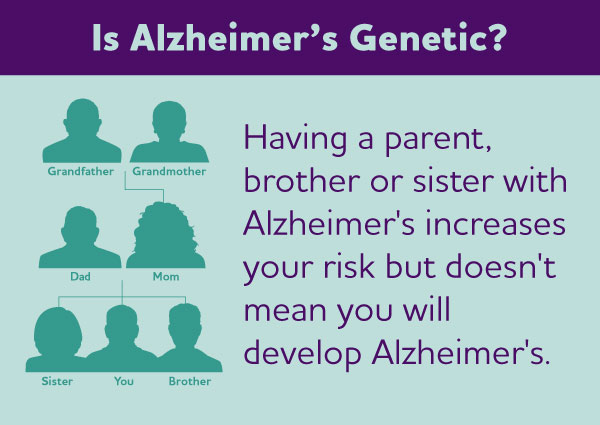
Fight Alzheimer’s Into 2025 and Beyond
Fight Alzheimer’s Into 2025 and Beyond
Don't miss your chance to make a generous gift to our 2025 Annual Fund Drive. Your donation today helps fund essential care and support to those who need it most, while also advancing critical Alzheimer's research.
Donate NowIs Alzheimer's Genetic?
 Family history is not necessary for an individual to develop Alzheimer's. However, research shows that those who have a parent or sibling living with Alzheimer's are more likely to develop the disease than those who do not have a first-degree relative with Alzheimer's. Those who have more than one first-degree relative with Alzheimer's are at an even higher risk. When diseases like Alzheimer's and other dementias tend to run in families, either genetics (inherited factors) or modifiable factors such as sleep, smoking habits, hypertension or diabetes can further increase risk.
Family history is not necessary for an individual to develop Alzheimer's. However, research shows that those who have a parent or sibling living with Alzheimer's are more likely to develop the disease than those who do not have a first-degree relative with Alzheimer's. Those who have more than one first-degree relative with Alzheimer's are at an even higher risk. When diseases like Alzheimer's and other dementias tend to run in families, either genetics (inherited factors) or modifiable factors such as sleep, smoking habits, hypertension or diabetes can further increase risk.
Genetics and Alzheimer’s
There are two categories of genes that influence whether a person develops a disease: (1) risk genes and (2) deterministic genes. Researchers have identified hereditary Alzheimer's genes in both categories.
- More than 100 risk genes are suspected to confer greater susceptibility for developing late-onset (age 65 or older) Alzheimer's, the most common form of the disease. Risk genes increase the likelihood of developing a disease but do not guarantee it will happen. Researchers have found several genes that increase the risk of Alzheimer's. APOE-e4 is the first risk gene identified and remains the gene with the strongest impact on risk for some populations. Testing positive for APOE-e4 may not mean the same for Alzheimer's risk across all racial and ethnic groups. Researchers estimate that between 40-65% of people diagnosed with Alzheimer's have the APOE-e4 gene.
- APOE-e4 is one of three common forms of the APOE gene; the others are APOE-e2 and APOE-e3. We all inherit a copy of some form of APOE from each parent. Those who inherit one copy of APOE-e4 from their mother or father have an increased risk of developing Alzheimer's. Those who inherit two copies from their mother and father have an even higher risk, but not a certainty. In addition to raising risk, APOE-e4 may tend to make symptoms appear at a younger age than usual, which adds to the complexity of understanding how APOE may contribute to a person's risk.
- However, there are several variations in the inheritance of APOE-e4 that need to be considered to determine an individual's risk. The risk for Alzheimer's from APOE-e4 can vary across populations. For example, in general, Europeans can have a higher risk than individuals that have some African ancestry such as African Americans and Caribbean Hispanic individuals. Some African countries have the lowest reported risk due to APOE-e4. Many people in the United States have ancestors from several population backgrounds and have inherited DNA from multiple ancestries.
- An estimated 20-30% of individuals in the United States have one or two copies of APOE-e4; approximately 2% of the U.S. population has two copies of APOE-e4.
- Unlike risk genes, deterministic genes directly cause a disease, virtually guaranteeing that anyone who inherits one will develop a disorder. Scientists have found rare genes that cause Alzheimer's in only a few hundred extended families worldwide. These genes, which are estimated to account for 1% or less of Alzheimer's cases, cause familial early-onset forms in which symptoms usually develop between a person's early 40s and mid-50s. The vast majority of individuals living with Alzheimer's have late-onset disease, occurring at age 65 or later.
Genetic testing
With the growth in public awareness of Alzheimer's and all other dementia, many people have questions about the genetics that drive disease and the value of genetic testing for Alzheimer's or other dementia risk.
Beta-amyloid and treatments
Many of the risk genes and deterministic genes affect processing or production and clearance of beta-amyloid, the protein fragment that is the main component of plaques. Beta-amyloid is a prime suspect in decline and death of brain cells. Two treatments, donanemab (Kisunla™) and lecanemab (Leqembi®), have demonstrated that removing amyloid from the brain is reasonably likely to reduce cognitive and functional decline in people living with early Alzheimer’s. Several other amyloid-targeting therapies are also in development.
About at-home genetic tests
Genetic testing services have become more widely available. Some tests may be conducted through laboratory services, and some at-home genetic tests don't require physician approval. Genetic testing for disease risk outside of a research setting or genetic testing for the purposes of treatment decisions must be considered carefully by an individual, in consultation with their family and physician. It is important to realize that obtaining genetic results is just information, and is not the same as having understanding and knowledge of what that information means. It is important to discuss any information you receive with a qualified professional.
Things to think about when considering genetic testing for Alzheimer's or another dementia include existing protections and rights around disclosure of results that might affect one's employment, health insurance, long-term care insurance, and how results may affect other members of the family. Learning genetic testing results may also invite other issues, such as anxiety about getting a disease or discrimination.
Individuals who are considering genetic testing for any reason should receive genetic counseling before a test is ordered and when the results are obtained. A genetic counselor can help make an informed decision about testing and can interpret the results and help navigate next steps. A genetic counselor may be found through the National Society of Genetic Counselors.
